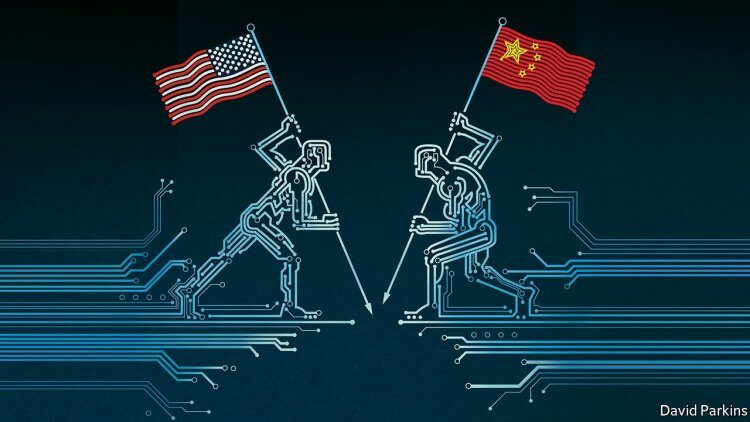
By: Dr Mehmood Ul Hassan Khan
Despite China-USA numerous meetings for achieving stable and sustainable bilateral relations the “US Military Complex Theory” and its “National Security Narrative” is rampant against China. According to global data, the U.S. weaponry sales expanded internationally several times once a new conflict broke out overseas.
Its arms sales during the Ukraine conflict peaked in 2022. Once again, U.S. military equipment sales to foreign countries reached a record $238 billion in 2023, up 16 percent year-over-year.
Ironically, the U.S. State Department terms weapons transfers and defense commerce as important foreign policy instruments with long-term regional and global security ramifications.
Foreign Military Sales and Direct Commercial Sales the former is government-to-government transfers of systems and services while the latter is U.S. contractors’ selling to governments make up the $238 billion export total.
It seems that ongoing emerging conflicts, war threats and intensifying pressures on NATO allies to buy U.S. arms, the Russia-Ukraine conflict, the Israel-Hamas, Red Sea, building so-called China threat in Asia-Pacific and Russia threat in Europe, cold-war mindset, bloc mentality, U.S. built security blocs to target China are numerous reasons behind the growth of arms sales in 2023. Ironically, war causes death, suffering, and inflation in the world yet U.S. weaponry sales have increased and prospered during crises. Thus its military complex theory remained at its peak.
In addition to this, apache helicopters, F-35 aircraft, and CH-47F Chinook helicopters were sold through Foreign Military Sales to Poland, the Czech Republic, South Korea, Germany and Bulgaria. Moreover, Italy, India and Saudi Arabia have privately negotiated Direct Commercial Sales authorizations for F-35 wings assemblies, GE F414-INS6 engine hardware, and Patriot Guided Missile.
Intensifying pressures on NATO allies to buy U.S. arms, the Russia-Ukraine conflict, the Middle East crisis, protection of Israel, building so-called China threat in Asia-Pacific and Russia threat in Europe, cold-war mindset, U.S.-built security blocs to target China are all reasons behind the growth of arms sales in 2023. War causes death, suffering, and inflation in every nation, yet U.S. weaponry sales have grown and prospered during crises.
Moreover, most recently a delegation from the US Treasury met its Chinese counterparts and subsequently, the Western media outlets intentionally again hyped the issue of China’s so-called excess industrial capacity.
Purposefully, some Western countries and multinational companies desire to pin the label of overcapacity or dumping on cost-effective Chinese goods. Resultantly, their biased narratives and short-sightedness will certainly backfire and hurt US firms and consumers.
During the meeting, the US Treasury Department and the US officials raised issues of concern about China’s industrial policy practices and overcapacity, and the resulting impact on US workers and firms. It signals that the US may use anti-dumping as an excuse to suppress Chinese companies and goods in the future.
In recent years, the hawkish politicians and military brasses have been intensifying their suppression and blockades against Chinese companies worldwide, under the guise of national security.
In order to contain Chinese companies like Huawei from gaining a competitive advantage in 5G technology and entering the US and global 5G markets, the US imposed systematic bans/sanctions on these companies, citing national security.
It has serious consequences on the US economy. The construction costs of communication networks in the US and its allies have been significantly increased, and progress has been severely delayed. China built more 5G base stations in three months than the US did in two years.
Currently, there is another growing trend among certain politicians in Western countries following the rapid advance of industries like new-energy vehicles (NEVs) and EVs in China.
Now the Western policy makers are intentionally, implementing notions of national security and anti-dumping. By labeling Chinese products as overcapacity or dumping some Western politicians are seeking to hinder these products from entering the US and global markets.
The Wall Street Journal in November 2023 claimed that some Chinese factories, saddled with overcapacity in a struggling economy, are trying to export their way out of trouble and stoking new trade tensions. It pinpoints that such rampant hype is typical blame-gaming of the US governments and policy makers.
Undoubtedly, the affordable and high-quality products exported from China have played a crucial role in alleviating inflationary pressures in the international countries and communities. Instead of stoking trade tensions these Chinese exports have actually contributed positively to helping the difficult economic recovery efforts in these countries.
In summary, intentionally Chinese-made goods are being blocked from entering the US market due to being labeled as products of overcapacity or dumping, American consumers will have to spend more money purchasing products with the same quality as Chinese ones.
Especially, unlike previous US sanctions against China’s high-tech rise under the pretext of groundless national security risks, this time consumer goods, in particular NEVs and EVs are likely to become the main target for the US to label China as pursuing overcapacity or dumping, thus ordinary consumers will be the first to feel the pain from growing trade tensions with China.
It fears that labeling Chinese products as the results of overcapacity or dumping will be a double-edged sword for both sides. Chinese enterprises, especially NEV companies, may encounter multiple obstacles in developing their international business strategies.
Seemingly, the US has been trying to asphyxiate Huawei and control its global expansion using the guise of national security but it failed. Now, the US starts a new round of attacks and uses overcapacity or dumping as an excuse to suppress other Chinese companies, its efforts will be futile and doomed to fail, too.
Successive governments of the US and Pentagon have been successfully implementing its military theory complex to protect its own vested interests in the world. Whereas Chinese government have been striving hard to achieve desired goals of global peace and stability through dialogue, diplomacy and development. China has been playing a positive, productive and participatory role in the global governance. It has also been trying hard to achieve and maintain true spirits of internationalism.
China is gearing up for the Year of the Dragon and conveying the message of multiculturalism, economic globalization, international cooperation, global south and last but not least, rule based global governance which vividly reflects good spirits of true brotherhood. The dragon plays a significant role in Chinese culture and is often used internationally as a symbol of China.
The dragon also symbolizes power, wisdom, wealth and nobility, closely associated with the imperial authority in China. Thus true spirits of dragon may create lights of peace, prosperity and stability in the world.
(Writer is Executive Director at The Center for South & International Studies (CSAIS) Islamabad
and Expert on China, CPEC & BRI)


